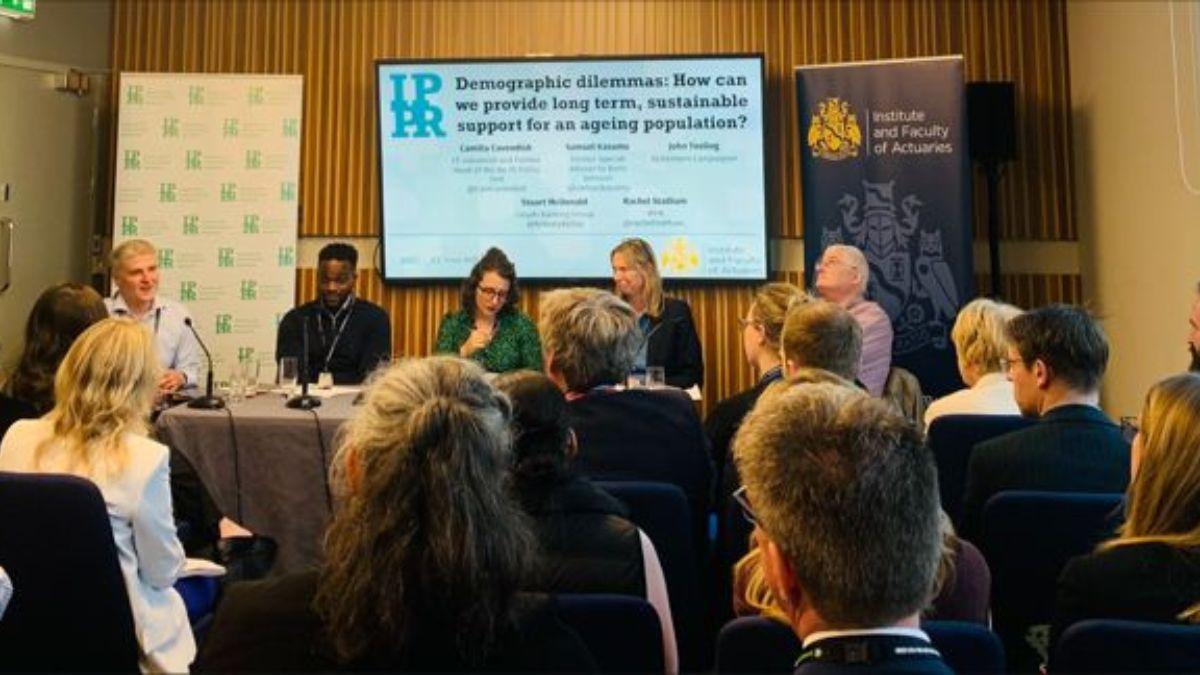 Our public affairs team was in full swing at the 2022 party conferences, first in Liverpool for Labour, then in Birmingham for the Conservatives. At both, they were proud to host fringe events that gave focus to some of the most pressing issues of our time. Here the team reports back, offering some insight into the rich panel discussions.
Our public affairs team was in full swing at the 2022 party conferences, first in Liverpool for Labour, then in Birmingham for the Conservatives. At both, they were proud to host fringe events that gave focus to some of the most pressing issues of our time. Here the team reports back, offering some insight into the rich panel discussions.
Since 2018, the IFoA has attended both the Labour and Conservative party conferences. These annual events, attended by the UK’s top political brass right down to ordinary party members, offer the IFoA a significant opportunity to engage with a breadth of stakeholders on our key policy priorities.
They also give us the chance to listen to a range of views drawn from both expert opinion and personal experience that can often be integral to our both current and future work. We were delighted that once more, the IFoA’s fringe sessions drew large and engaged audiences, fostering excellent and lively discussion between panelists and participants alike.
First up was the Labour conference in Liverpool. Perhaps as a consequence of the Conservative Party’s lengthy leadership wrangling across the summer – followed by a rocky start for the new government – the mood of Labour delegates and shadow ministers was the most buoyant we have seen in years.
This jubilant atmosphere – bolstered by the party’s double-digit polling lead, which undoubtedly enthused an air of optimism after 12 years in the political wilderness – raised hopes the party might just be on course to form a government at the next election.
Moreover, the presence and engagement of so many of the UK’s businesses at the conference demonstrated that the belief in Labour’s positive electoral prospects was by no means contained to the party-faithful.
The IFoA’s fringe event focused on our Poverty Premium campaign. Sameer Keshani (former Chair of the General Insurance Board) was joined by panelists including Shadow Work and Pensions Secretary Jonathan Ashworth MP and member of the Treasury Select Committee Emma Hardy MP.
Providing a practitioner’s viewpoint, Sameer underlined the major inequalities that increased poverty in the insurance market. He suggested that there was room for greater government intervention to alleviate these. Commenting on the Chancellor’s September fiscal event, Ashworth remarked that it was the “most divisive, unfair, unjust budget probably in living memory”. He said it would worsen poverty and inequality in British society.
By the time of the Conservative Party conference in Birmingham, a new dichotomy had opened up between Labour and the Tories that was not one of traditional party ideologies – but one of mood. Amid market turmoil and dire polling following the September ‘fiscal event’, widespread skepticism of ‘Trussonomics’ had a clear hold over attending MPs and party members. The atmosphere was a far cry from the one seen a week earlier in Liverpool.
By day two, the Prime Minister’s decision to U-turn on a major policy – the axing of the 45p rate of tax – dampened already somber delegates into feelings of despair and defeat. Noticeably, swathes of MPs from across the party were absent by the latter end of the gathering, with last-standing attendees expressing dismay and disappointment mostly in Truss’s seemingly all-promise-yet-no-delivery of the Thatcher-like political conviction she had conveyed weeks earlier.
Nevertheless, a highlight of the Birmingham gathering was undoubtedly our rich panel discussion on ‘demographic dilemmas’ and how Britain, as a society, might provide long-term, sustainable support for an ageing population.
IFoA member Stuart McDonald MBE spearheaded the discussion, alongside panelists including Baroness Camilla Cavendish (FT columnist and former Head of the No 10 Policy Unit) and Samuel Kasumu (former Special Advisor to Boris Johnson).
Alzheimer’s campaigner John Teeling opened the discussion. He gave a moving account of his own lived experience of dementia and how it had impacted him and his family. Insightfully, Teeling also gave a personal perspective on how diagnosis and follow-up care of age-related ailments might be managed in the future. This opened up a lively discussion, dominating much of the session, which centred on the role of the state versus the individual in health and social care provision.
Overall, the conference season once again demonstrated the value of face-to-face engagement, allowing us to continue to build the IFoA’s reputation as a trusted voice, and increase awareness of actuaries’ expertise on some of society’s biggest challenges.